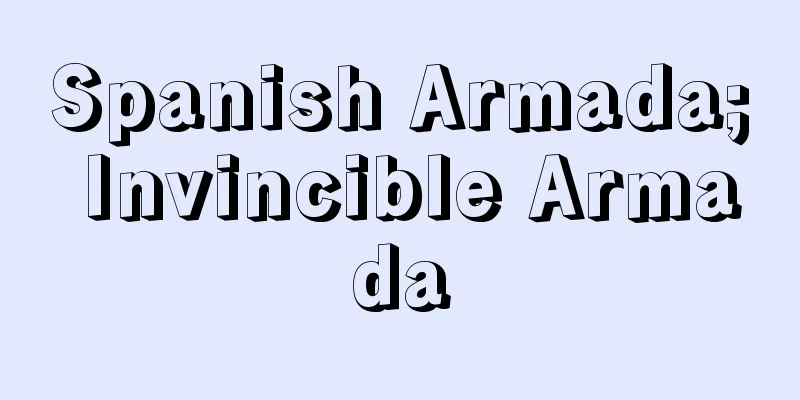Spanish Armada; Invincible Armada

|
In 1588, King Philip II of Spain (reigned 1556-98) sent a large fleet into the English Channel in an attempt to launch a direct attack on England, led by Elizabeth I (reigned 1558-1603). In Spanish, it is called the Armada (meaning "navy" or "fleet"), or the Armada Invencible. Spain, under the command of Alonso Pérez de Guzmán, Duke of Medina Sidonia, dispatched about 130 warships with about 8,000 sailors and 19,000 soldiers. They set sail from Lisbon in May of that year and entered the Straits of Dover at the end of July. The English fleet led by Charles Howard (→Nottingham) had less than 100 ships, but they used their maneuverability to keep the Spanish in check with artillery fire, and on August 7-8, they used a "fire ship" strategy to send burning ships to the Spanish fleet anchored off the coast of Calais, causing chaos and sinking several ships, forcing them to retreat north. The Spanish fleet then detouring from the North Sea to Scotland suffered terrible voyages, with ships damaged, food and water shortages, and thousands of people losing their lives due to bad weather. By the end of September, less than half of the ships had returned. Spain's defeat gave control of the seas to England, and Spain's international trade and colonial management suffered a blow, leading to the decline of its national power. It was also an important epoch in terms of warfare and tactics, as it replaced galleys with galleons and replaced "slashing enemy ships" with artillery fire. Source: Encyclopaedia Britannica Concise Encyclopedia About Encyclopaedia Britannica Concise Encyclopedia Information |
|
スペイン王フェリペ2世(在位 1556~98)が,エリザベス1世(在位 1558~1603)率いるイングランドへの直接攻撃を企図し,1588年にイギリス海峡に送り込んだ大艦隊。スペイン語でアルマダ(「海軍」「艦隊」の意)Armada,またはアルマダ・インベンシブレ Armada Invencibleと呼ぶ。スペインはメディナ・シドニア公アロンソ・ペレス・デ・グスマンを司令官に,約 130隻の戦艦に船員約 8000人,兵士約 1万9000人を乗り組ませ,同年 5月にリスボンを出航,7月末にドーバー海峡に入った。迎え撃つチャールズ・ハワード(→ノッティンガム)率いるイングランドの艦隊は,わずか 100隻にも満たなかったが機動力をいかした砲撃でスペインを牽制し,8月7~8日にはカレー沖に投錨していたスペインの船団に炎上した船を送り込む「火船」作戦で攪乱,数隻を撃沈し北へ敗走させた。その後,北海からスコットランドを迂回したスペイン艦隊の航海は船の損壊や食料・水不足,悪天候で数千人が命を失うなど凄惨をきわめ,9月末までに帰還できた船は半数以下に減っていた。スペインの敗北により,制海権はイギリスの手に渡り,スペインの国際貿易,植民地経営は打撃を受け国力の衰退を招くにいたった。また,戦法・戦術においてガレー船からガレオン船に,「敵船斬り込み」から砲撃に置き換わった点で重要なエポックとなった。
出典 ブリタニカ国際大百科事典 小項目事典ブリタニカ国際大百科事典 小項目事典について 情報 |
Recommend
Otori Island
…It became a U.S. territory in 1899, and was used...
Eosin
Eosin Y and Eosin B are known. [ I ] Eosin Y: C 2...
Hanafi - Hanafiha
《〈Arabic〉 Ḥanafī 》 One of the four Islamic schools...
Collection of Fallen Leaves - Rakuyoshu
Dictionary. Compiled by the Society of Jesus in Ja...
Duchy of Burgundy (English: État bourguignon) French
A territory of the Duke of Burgundy in medieval F...
Theaceae
…With this enthusiastic background, the flower la...
Asian Peace Association
…After returning to Japan, he made a speech entit...
The Last Commandments of Lord Kujo
This is a set of family precepts written by the Mi...
Food bleach - food bleach
A chemical used to whiten food. Food ingredients i...
Ikarichochin - Ikarichochin
… As mentioned above, the living brachiopoda are ...
Monbetsu [town] - Monbetsu
A former town in Saru District, southern Hokkaido....
Simple Insurance Bureau
...Its internal bureaus consist of the Minister&#...
Salerno - To be (English spelling) Salerno
The capital of the Province of Salerno in Campani...
Ancerl, K.
…After World War II, in 1945, the orchestra was m...
Urushi tribute - Urushi nengu
It is also called urushi-ei (lacquer tax). It was ...









